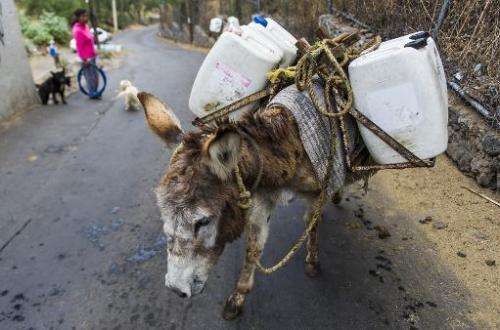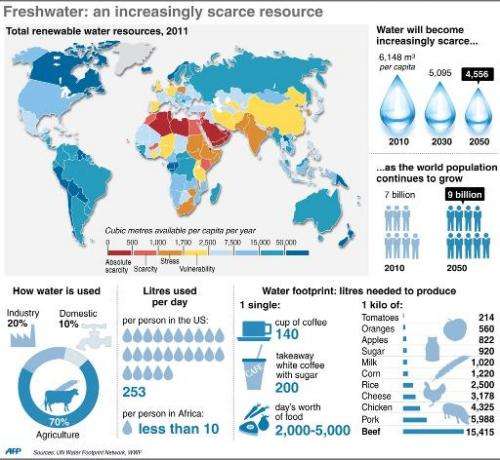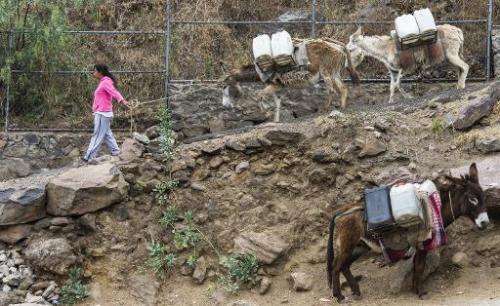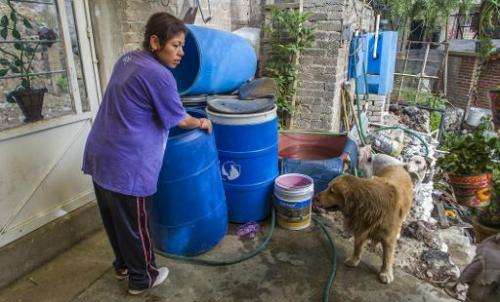Water a precious resource in Mexico

As she has every day for 26 years, Delfina Salinas, a stocky Mexican woman, loads plastic jugs onto her donkey for a 30-minute walk to fetch water.
In Tehuixtitla, a mountainous area south of Mexico City, there is no running water. Salinas is used to this drudgery.
"If you do not go to the water, the water is not going to come to you," she said, taking a break to wipe sweat from her forehead.
Today in Mexico, Latin America's second largest economy, 10.5 million people—9.1 percent of its 118 million people—have no direct access to drinking water, according to government figures.
President Enrique Pena Nieto said recently that 35 million Mexicans have limited access in terms of quantity and quality. He said resolving this basic problem was a "national priority".
Just like Delfina, Lourdes Torres, a 39-year-old homemaker and mother of three, waits her turn with two donkeys to load 160 liters (quarts) of water in some 30 jugs.
Back home they will be used for showers every three days, cleaning and watering plants.
"Yes, it is a pity to have to do this, especially when you know there are people who have running water and we are struggling here," said Torres.
A threatened capital
In the overpopulated valley where Mexico City lies, hydrological problems are accentuated by the overuse of water supplies during the Spanish colonial era to build the city.

There is only one small river, and 73 percent of the city's water comes from underground. Overuse threatens to deplete this resource within 150 years and means the city is sinking a centimeter per year.
The rest of the water that feeds the city comes from reservoirs 200 kilometers (120 miles) away.
But the system uses a lot of electricity and leaks 40 percent of its water, says David Vargas, from NGO Urban Island, which has developed a system to catch rain water for use in homes.
The rainy season only lasts from May to September, and water is so scarce that one in three homes in Mexico City endures rationing.

"But this situation could improve with the catching of rain water," said Vargas, a civil engineer. He said his scheme has helped 10,000 households in this vast city of more than 20 million people.
Even though it is in its early stages, this project has been praised by the United Nations and rewarded by the Massachusetts Institute of Technology.
It has already set up 1,400 units for a relatively small cost in isolated communities like Tehuixtitla.

'Collective denial'
Isla Urbana recently extended its activities to rural areas like San Andres Daboxtha, a parched town in the central state of Hidalgo.
There, running water is available only in the morning and only in some neighborhoods located at some altitude.
"I have to get up in the middle of the night to have water," complains Leticia Carpio, a 31-year-old homemaker. She hopes this will all be over with the new trick of catching water falling from the sky.
Vargas says his design is only one of several possible solutions.
But he warns that Mexico's government still has 20th-century ideas on how to manage water resources and hopes to solve problems with bigger pipe systems bringing in water from longer distances with greater consumption of electricity.
Jose Cohen, who made a documentary on Mexican water problems entitled "H2O MX", says it is important to raise public awareness on this issue because here so much attention is grabbed by drug trafficking and economic reforms.
"The water problem is not on the agenda in Mexico. We are living a collective denial while what is at stake is the foundation of life," said Cohen.
© 2014 AFP

















